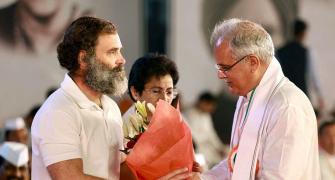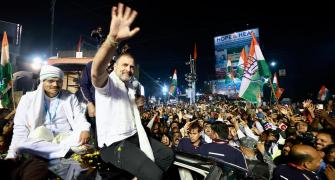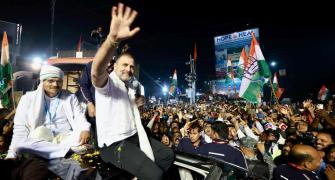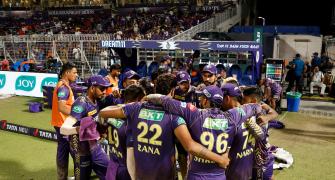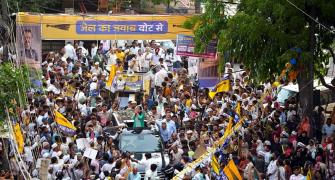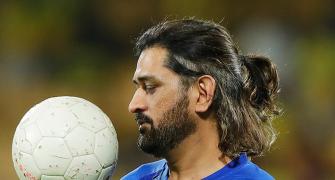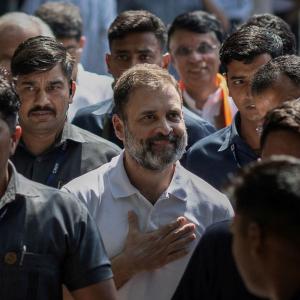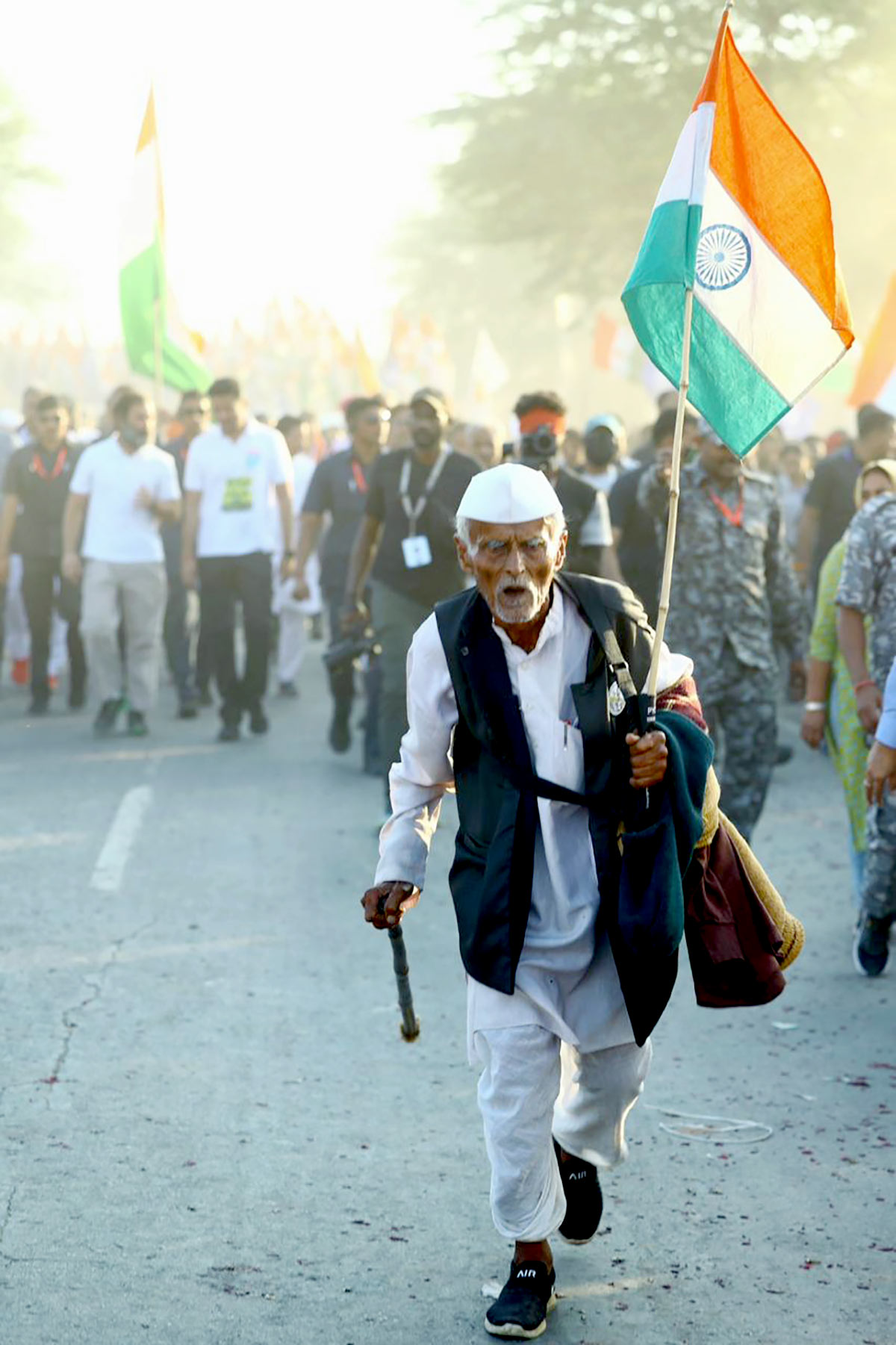Anger cannot be an end in itself to Rahul Gandhi's politics -- it must instead catalyse a new political strategy, argues Nilanjan Mukhopadhyay.

Rahul Gandhi ko gussa kyun aata hai?
In the 1980, the Saeed Mirza directed cult-classic film, whose title is aped in the first sentence of this column, the protagonist initially constantly got angry for the wrong reasons.
The character of Albert Pinto, a Goan Christian car mechanic settled in the then Bombay, was part of the working class hordes, but disliked his ilk and wished to be rich.
The film was about the 'resolution' of him being on a short fuse perpetually. By the end of the film, Naseeruddin Shah, who essayed that role, still got cross, but for the 'right' reasons, or 'causes'.
The film was not about anger management, but concerned the provocation or basis for getting infuriated.
The director disapproved regular momentary outbursts. But, he appreciated the resentment if it was part of a well-worked-out action plan for the collective good of one's own.
By all accounts, Rahul Gandhi's recent speech had several angry facets to it. These have drawn a fair amount of traffic on social media and the Internet, and most of it not very unfairly.
Supporters have had to scratch their heads to think of reasonable explanations for his outbursts. On the other hand, adversaries have had a field day.
Because at any given time, the firepower of Rahul Gandhi's opponents is far greater than his and the Congress', he has been portrayed as someone who crossed the Rubicon of public decency and courteous behaviour.
Not leaving matters solely to the social media warriors and television spokespersons of his party, Prime Minister Narendra Modi too entered the fray.
He picked up the gauntlet on behalf of the youth of Varanasi and accused Rahul Gandhi of slandering them as drunkards while they had transited to looking towards a better future.
Give Modi half a chance to hijack a 'cause', and he would do so -- in this case, he opens the floodgates of an endless stream of sympathy for Kashi's youth.
Among others issues, three points from a Rahul Gandhi speech during his ongoing Bharat Jodo Nyay Yatra stirred controversy.
The first was his assertion that he spotted drunken youth at night in the prime ministerial constituency, wasting themselves and time away by swaying to rowdy music.
He also referred to the consecration ceremony at the Ram temple in Ayodhya. While drawing attention to the celebrity-packed audience, instead of having citizen-invitees from the Dalit, tribal and OBC communities, he dropped the names of Amitabh Bachchan and Aishwarya Rai.
In one of the videos in circulation, he points in different directions or site locations of celebrities named.
He also states that Aishwarya Rai was dancing at one of these. This immediately provided his rivals with an opportunity to accuse him of misogyny.
The third controversy, also most raucous, was over Rahul Gandhi deriding a television journalist and aggressively asking him the 'name' of his channel's owner.
At one point, the crowd obviously got excessively boisterous and the scribe probably got more than verbally assaulted, for Rahul Gandhi tells supporters repeatedly, not to hit the newsperson.

The point that the Congress leader was trying to make was simple: That Indian news media is dominated by upper caste Hindus and there is very little representation of people from what the late Bahujan Samaj Party founder Kanshiram called, the Bahujan.
This was not the first time Rahul Gandhi made the same point, importantly with the same sort of boorishness.
This deficit is not of the media's alone but is a universal malaise -- it also extends to religious minorities being grossly under-represented in every sector.
Rahul Gandhi completes two decades in public life next month -- in March 2004, the Congress announced that he was entering the fray for the fourteenth Lok Sabha from Amethi.
In these two decade, he may not have learnt many lessons, but one: Words are mostly framed out of the context by the soundbite brigade.
Whatever provocation, if any, there was for Rahul Gandhi to ask the name (read caste identity) of the TV reporter and his channel owner, is not part of the clip in circulation.
But being smug with journalists has become a habit with him -- recall his quip during a press conference last year after his disqualification from the Lok Sabha.
Then, a journalist merely asked if he would offer to apologise for his 'Modi surname' remark of 2019.
Instead of providing a straightforward answer, he said: 'My name is not Savarkar, it is Gandhi, and a Gandhi never apologises.'
When Modi does not address pressers, Rahul Gandhi should aim to win over people and journalists with good behaviour. But he loses this opportunity time and again.
Furthermore, the answer got the goat of his party's alliance partners too, especially those in Maharashtra for the iconic status of the controversial V D Savarkar.
Likewise, there was little need for Rahul Gandhi to refer to Aishwarya Rai.
He forgets that most celebrities who were at the Ram temple inaugural could not have said when the government representative contacted with the invitation: 'Thank you for the invite, but I shall be unable to attend due to prior commitment (or personal considerations)'.
The presence in Ayodhya meant to be counted among the favourites of the regime. The target should be the person who begot this system, not those who were 'summoned' for use as 'adornments' on the crown of the 'emperor', also acting as the high priest on that day.
The Varanasi corollary has certain validity. Pollsters have long wondered why people still repose electoral faith in Modi despite accepting that there are large areas of failure as far as governance is concerned, especially jobs, prices and other livelihood anxieties.
Yet, people are seemingly intoxicated on a narrative of prejudice, fear and hatred and every other issue appears insignificant when juxtaposed with Modi's 'success' at 'sorting' out the 'other'.
Furthermore, this in a lighter vein, the city which chants Lord Shiva's name from one dawn till the next one, has a cultural tradition of soaking in the thandai laced with, you know what!
Rahul Gandhi can no longer act like an insolent schoolboy who rides on his parentage.
It is true that a significant section of journalists who rush to his events are on the lookout for opportunities to pinion him.
But they are not the malaise, instead are just either symptoms of the deeper malfunction, or are victims of the omnipotent apparatus created by this regime.

Rahul Gandhi's objective should not be to 'win' or 'score' a point at a press conference or make an emphatic point during a public speech.
His goal should be to take away a small slice of votes away from the BJP's pie with every utterance of his.
Rahul Gandhi must get angry. But his anger cannot continue to be vent on those who perforce have to play along -- either journalists directed by channel heads or chief of bureaus to 'rattle RG', or those who have chosen to be appropriated for their survival.
Anger cannot be an end in itself to his politics -- it must instead catalyse a new political strategy.
Rahul Gandhi's task is not to alienate anyone and be persuasive with his words.
Instead of pushing anyone away from him with his public behaviour, he must impart strength to those who are unable to muster courage to voice their sentiments -- whether they are in the media, celebrities in their own right, or are merely ordinary Indians requiring their innate sense to be bolstered.
Nilanjan Mukhopadhyay is an author and journalist based in Delhi-NCR. His latest book is The Demolition, The Verdict and The Temple: The Definitive Book on the Ram Mandir Project. He is also the author of Narendra Modi: The Man, The Times.
Feature Presentation: Aslam Hunani/Rediff.com

